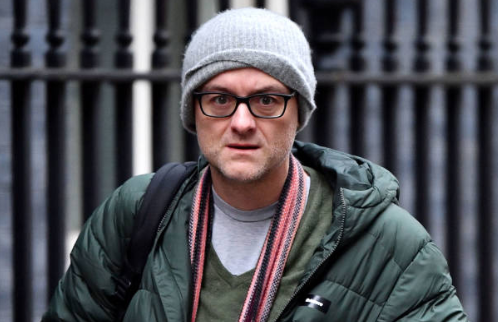26 April 2020
Sage Penetrated
Cummings at the gate.
By John Watson
 Every profession has its holy of holies and, for the medical profession, the Scientific Advisory Group for Emergencies (SAGE) is about as holy as you can get. It gives its advice in secret. Membership, until published by The Guardian recently, could only be revealed by the member. And the names revealed by The Guardian read like a Who’s Who of medical science: top government scientists, top academics, top figures from the health service and the director of the Wellcome Trust. It doesn’t come more eminent than that and yet, horror of horrors, Dominic Cummings has been attending meetings held to decide what advice to give to the government in relation to Covid-19. Inappropriate! Mien Gott! It is practically sacrilege. The man is hardly educated. Well, yes he did pick up a first in ancient and modern history from Oxford to be sure, but he is no more a scientist than Donald Trump is a doctor. No wonder Labour has said that it should stop. No wonder some Conservatives support them. No wonder that The Guardian is foaming at the mouth, something which by happy coincidence may help to maintain its circulation.
Every profession has its holy of holies and, for the medical profession, the Scientific Advisory Group for Emergencies (SAGE) is about as holy as you can get. It gives its advice in secret. Membership, until published by The Guardian recently, could only be revealed by the member. And the names revealed by The Guardian read like a Who’s Who of medical science: top government scientists, top academics, top figures from the health service and the director of the Wellcome Trust. It doesn’t come more eminent than that and yet, horror of horrors, Dominic Cummings has been attending meetings held to decide what advice to give to the government in relation to Covid-19. Inappropriate! Mien Gott! It is practically sacrilege. The man is hardly educated. Well, yes he did pick up a first in ancient and modern history from Oxford to be sure, but he is no more a scientist than Donald Trump is a doctor. No wonder Labour has said that it should stop. No wonder some Conservatives support them. No wonder that The Guardian is foaming at the mouth, something which by happy coincidence may help to maintain its circulation.
The question is, of course, why is he there and, to answer this, one needs to think about what Sage is there to do. Had Cummings joined the panellists in the Grenfell Tower enquiry it would have been obvious that he was there to try to influence what was ultimately said to the public. But Sage is different from that. Its purpose is to advise the Government and to enable the Government to make better decisions in relation to the Coronavirus. Giving advice in these circumstances requires two-way communication. Sage needs to come up with the scientific analysis but it presumably needs some indications as to what is politically practicable and also as to the questions to which the Government needs to know the answers as it formulates its policy. That means that in a quick-moving crisis like the pandemic any formal structure for reporting and setting agendas has to be supplemented by conversations. Mr Cummings is a close adviser to the Prime Minister and will help him to make decisions. It surely only makes sense for him to listen in on the meetings and to raise questions which concern him.
It is possible, of course, that he has a less constructive role. Perhaps he bullies the experts and tries to drive the decisions in a particular direction. If so, he is more of a fool than I take him for, because the government is desperate to find the best way to limit Covid-19 damage and to start skewing the advice on which it will itself rely would be obviously self-defeating. Perhaps he is there just because he likes to meddle, or he is fond of coffee and biscuits, or he likes pulling the beards of the academics. Well yes, possibly, but none of that is really very likely. I imagine that his presence, unorthodox as it may be, is simply so that he and the Cabinet pick up the nuances and are as well-informed as possible in facing the difficult task which lies before them. If that is so, then surely it can only be a good thing and those who are trying to disrupt a useful line of communication between the Government and the scientific community should think rather carefully about the damage they may be doing.


